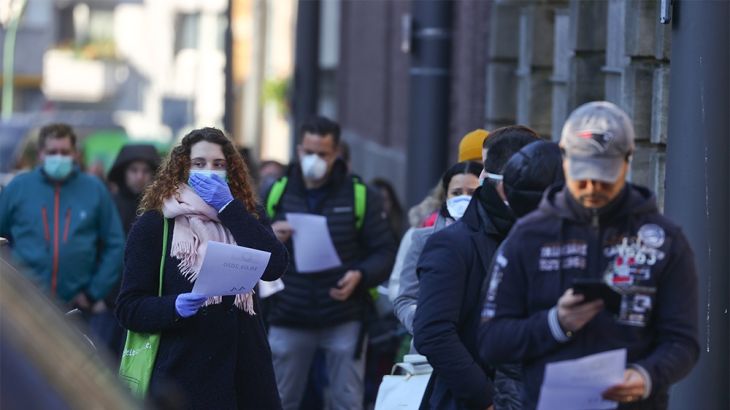Germany: Will authorities crack down on ‘corona parties’?
Germany is the country third most affected by the outbreak, after Italy and Spain, with 14,481 cases and 43 deaths.

Berlin, Germany – On Thursday evening in Tempelhof Field, the former airport turned public park, Nicolas Engel improvised a tune on an upright piano he wheeled onto the runway, as a well-spaced audience sat around him on the tarmac, enjoying the melody float through the warm spring air.
“People still want to go out,” the Swiss musician told Al Jazeera. “Here on the field you have a lot of space, so even if there’s a crowd you can sit two metres from each other.”
Keep reading
list of 2 itemsWhat happens if you catch the new coronavirus?
The scene was calmer than earlier this week, when a spell of unseasonably warm weather drew thousands of people to the park to cycle, play football or drink with friends – including large groups of dozens of teenagers free from shuttered schools, in what politicians and local media have branded “corona parties”.
Germany is the country in Europe third most affected by the coronavirus outbreak, after Italy and Spain, with 14,481 confirmed cases and 43 deaths.
However, it has not imposed the sweeping restrictions on movement seen in those nations, and in most parts of the country, people continue to move and socialise freely. But leading politicians have warned this will change quickly if the public does not begin to heed warnings about social distancing advice and minimising close contact with others.
“If a lot of people don’t restrict themselves voluntarily, then eventually the only instrument that will remain is a Bavaria-wide curfew. That must be clear to everyone,” Bavarian leader Markus Soder said on Thursday, while announcing the nation’s first curfews in the district of Wunsiedel and the town of Mitterteich, both near the Czech border.
|
|
#staythef***athome
Markus Blume, general secretary of Chancellor Angela Merkel’s ruling Christian Democratic Union, agreed, tweeting “stay at home, otherwise curfews are inevitable”, adding the hashtag #staythef***athome.
Hours later, Freiburg became the first large city to announce a curfew, which will begin on Saturday and last until April 3.
“We are aware that this serious decision will have significant restrictions on the life of Freiburg. As things stand, the protection of the public must take precedence over all other considerations,” said Mayor Martin Horn in a press statement.
Germany’s federal government announced sweeping measures to limit the spread of the virus on Monday, ordering places of worship and many non-essential shops to shut.
But the country’s system of government means that curfews and other restrictions are decided at a state or sometimes local level under the Infection Protection Act of 2001, leading to a divergence of prevention measures. While Bavaria has banned all events larger than 1,000 people, in Berlin the upper limit is 50.
Personal life
In the capital, some non-essential businesses such as tattoo parlours and clothing alteration stores remained open during the week, with shopkeepers telling Al Jazeera they were unsure if or when they should close.
Police have conducted evening inspections on bars, which have been shut, and restaurants, which must close at 6pm, finding almost 100 violations of current restrictions on Wednesday night, a police spokesperson said on Thursday.
Mitterteich, the sleepy Bavarian town of 7,000 where 27 have been infected by COVID-19, may spell out the changes yet to come across the country. Residents there must now have a valid reason to leave the house, such as working, visiting shops or pharmacies, or walking a pet.
“The personal life of the [individual], this has a very high value in our constitution. So any restriction must be really proportional,” said Sigrid Wienhues, an attorney specialising in administrative law based in Hamburg.
“You need the facts [to prove] that it’s really necessary, that there was no other means to prevent further spread and to prevent really high risk to the health system of Germany.”
After listening to Engel’s impromptu piano recital in Berlin, artist Meme Hrteg said she could not have imagined it taking place in her native Denmark, where harsher restrictions on daily life have been enforced.
“I think that in Germany, they are taking it very easy and not so seriously as they should do,” she told Al Jazeera. “I’m just waiting for them to [introduce] some stricter rules.”
Hours later, Freiburg became the first large city to announce a curfew, which will begin on Saturday and last until April 3.
“We are aware that this serious decision will have significant restrictions on the life of Freiburg. As things stand, the protection of the public must take precedence over all other considerations,” said mayor Martin Horn in a press statement.
Germany’s federal government announced sweeping measures to limit the spread of the virus on Monday, ordering places of worship and many non-essential shops to shut.